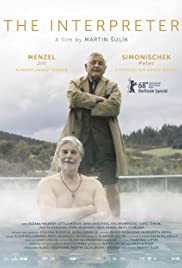
THE INTERPRETER
Slovakia/Czech Republic/Austria, 2018, 125 minutes, Colour.
Jiri Menzel, Peter Simonischek.
Directed by Martin Sulik.
The Interpreter proves that there is still plenty of room on cinema screens and on television for stories about World War II, the plight of the Jews, the harshness of the Nazi regime and the actions of the SS.
This film is a collaboration between Slovakia, where a lot of the action takes place, the Czech Republic which at the time of the war was united with Slovakia as Czechoslovakia, and Austria, this film opening in Vienna.
The Interpreter of the title is played by veteran Czech actor and director, Jiri Menzel. At the beginning of the film, he arrives by train in Vienna, seeks help from people of the station, eventually finds his destination and confronts a middle-aged man, George, played by Peter Simonischek (whom international audiences may well remember for his role as Toni Erdmann), accusing his SS father, who had published a book about his exploits, and threatening to kill him. This doesn’t happen and the interpreter decides to go back home, a sense of failure, a sense of failure to his parents, and the mystery where they are buried still unsolved.
But, the visit, has an effect George. He contacts the interpreter and they meet, George proposing that the two of them go on a journey into Slovakia, revisit some of the villages and see the families where his father worked, to try to get some understanding and information. The interpreter agrees but is rather hardheaded and makes a contract as regards payment.
This is certainly rather an odd couple in all kinds of ways. The interpreter is burdened by decades of unhappy memories, of injustices, of memories of the persecution of the Jews. George, on the other hand, leads a rather carefree life, knows very little about the father whom he resents.
And the beginning of the journey is odd. The interpreter very serious, trying to track down people, documents, information. George on the other hand goes to clubs, lives the high life, flirts, drinks… And actually gets robbed by a pickpocket whom he lets go. The interpreter is rather reluctant to go on in this vein. George offers more money.
The latter part of the film has the two actually visiting some of the villages in Slovakia, in the mountains, meeting the farmers, trying to remember the past, but many of the farmers very reluctant to talk about those days. George’s father had left many photos, annotated with names and dates so they have clues to pursue.
So, what follows, is the interpreter at least venturing on his quest. What follows also is George learning more about his father, more about the war, the role of the SS, the persecutions and deaths. Maybe that is all is possible in the early part of the 21st-century.
There are not a lot of answers in this film – the journey and the process is what is important.
1. The title, the focus on The? His quest?
2. The locations: Austria, Vienna, Slovakia, Bratislava, the countryside and villages? The musical score?
3. The theme of the sons of victims and the sons of killers? The impact of murders, especially in the Holocaust?
4. 21st-century, going back into the past, knowledge of the past and World War II, of the high cost? The possibilities for understanding? Healing? Reconciliation?
5. The background of the war, the role of the SS, the ambitious officer, his family, his control and power, responsibility for the deaths? The photos that he kept and annotated? His writing and publishing the book? The reasons? Old age, hospital, the memory of the death of his sickly daughter, his son surviving, detached from his father, not exactly knowing what happened?
6. Ali, aged 80, his life, work as an interpreter, the memory of his parents, the deaths and the Holocaust, not knowing when they were buried? His daughter, contact, her being a teacher? The Jewish background? His quest, at the station, with the gun, asking people the way, going to George’s house? Meeting, going to the toilet, the drink of water, giving him the book, the trading of insults?
7. His disappointment, going home, the phone call from George, the meeting, George proposing their travelling together to discover the past, providing the photos and the annotations? The issue of pay? The motivations for each man?
8. The journey, George and his lifestyle, drinking, women, the swimming pool, the clubs, the thief? Ali and his being more sober, written, involved in the search, the documents, getting information, the photos? His decision to leave? George and the offer of payment and his continuing?
9. Going to meet people, going into the valley, the farmers, killing the sheep, remembering the past, the unwilling to speak?
10. The daughter, with the children, the concert, the Bach music?
11. Travelling further, the questions, interviews, the leads?
12. The effect on Ali, his age, how much satisfaction? His death?
13. George, learning about his father, knowing some of the things that happened and the consequences and effects? Visiting his father in hospital? His sitting in the park, the crane effect and leaving George in the park?
14. The film as a contribution to Holocaust memories and healing?